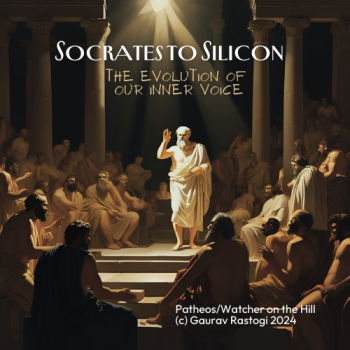
Metanoia.
“Metanoia”…the word came to mind silently one morning in that period between sleep and wakefulness, and stayed around after one was awake. What does this word mean, and why was it ringing in the ear?
The dictionary says it means a change in one’s way of life resulting from penitence or a spiritual conversion. The word is Greek, and the English versions of the Christian Bible’s New Testament often translated this Greek word as “repentance”, and a whole culture has unfolded because of this translation, oriented towards guilt, sin and repentance. Clergy could offer the change to repent and therefore become more powerful intermediaries between the sinners and the absolver of this sin, said to be God.
There was one voice of dissent early on. This was a person called Tertullian, who is thought of as the father of western Theology. Tertullian was the first one to protest that the translation of Metanoia into “repentance” was not a confession of sins, but a change of mind. We are usually running into the outside world samsara, always looking for validation in things that we see in the outside world. A redirection of the energies inwards is exactly a change of mind. When we stop looking for completion outside, and begin to find the peace inwards in our own hearts. Dhyana or Meditation is metanoia, from this perspective. A change of mind, a change of heart, and a change of direction from centrifugal to centripetal.
Now imagine if the original Greek had been translated correctly and interpreted in the same way that yoga does! It would mean a redesign in the foundation of one of the largest organized religions. Instead of focusing on paying for sins through intermediaries, there would be a focus on an inner transformation, which does not, and can not, require brokers to intercede, interpret, and intermediate. There would be no cult, but the original message of Jesus could be transferred just the way it was said. As an inner transformation that cannot be had from the outside, and this inner work is something very personal, very private, very silent. This doesn’t require a social or cultural system, no set of beliefs, and definitely no power structure to enable this transformation.
Tertullian said another famous thing that rings a bell, but is also interpreted in the exact opposite way. Credo quia absurdum (I believe because it is absurd) is the usual way he is paraphrased. In this, Tertullian is explaining his reasons for believing in Jesus Christ, and that the reasons for belief are that there is no reason possible. That’s a strange and striking argument, isn’t it? It’s an almost child-like assertion of truth without facts, and the kind of argument that can be heard in a children’s playground. But what if you think about it differently. The capacity to reason is the responsibility of the mind. When all reason is consumed, something still remains. When the mind is no more, something still remains. That something must be absurd, irrational, unreasonable. The world is absurd because it is unknowable, and therefore there is a need to believe.
The mad greek was right, but he’s long gone, and his words are just the ramblings of another madman.













